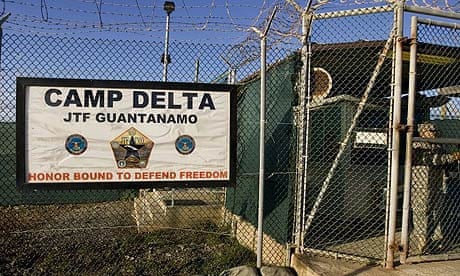A senior Bush administration official has admitted that a Guantánamo Bay detainee was tortured by the US military, leaving him in a "life-threatening condition".
Susan Crawford, the Pentagon official in charge of military tribunals at the camp, said Mohammed al-Qahtani, a Saudi suspected of involvement in the September 11 terrorist plot, was subject to sustained isolation, sleep deprivation, nudity and prolonged exposure to cold. She said the torture meant he could not be prosecuted.
"We tortured Qahtani," she told the Washington Post. "His treatment met the legal definition of torture. And that's why I did not refer the case [for prosecution]."
Crawford is the first senior Bush administration official responsible for reviewing practices at Guantánamo to admit publicly that a detainee was tortured.
Speaking publicly for the first time since her appointment two years ago, Crawford said the physical harm suffered by Qahtani – as well as the combination and duration of interrogation techniques used against him – took his treatment into the threshold of torture.
"The techniques they used were all authorised, but the manner in which they applied them was overly aggressive and too persistent," she said. "You think of torture, you think of some horrendous physical act done to an individual. This was not any one particular act; this was just a combination of things that had a medical impact on him, that hurt his health. It was abusive and uncalled for. And coercive. Clearly coercive."
Crawford added that "it was that medical impact that pushed me over the edge" to call it torture.
Qahtani, 30, was barred entry to America in August 2001 and is alleged by US authorities to be the 9/11 plot's "20th hijacker". He was captured in Afghanistan in 2002 and brutally interrogated for 48 days using a plan approved by the former US defence secretary Donald Rumsfeld.
"For 160 days [Qahtani's] only contact was with the interrogators," said Crawford. "Forty-eight of 54 consecutive days of 18- to 20-hour interrogations. Standing naked in front of a female agent. Subject to strip searches and insults to his mother and sister."
His treatment twice resulted in his hospitalisation with serious heart problems. A military report shows Qahtani was threatened with a military dog, forced to wear a bra and told his mother and sister "were whores". He was attached to a leash and "forced to perform a series of dog tricks".
The US dropped the death penalty case against Qahtani in May last year without explanation. His lawyers at the time attributed it to evidence he had been tortured while in US custody.
In November, military prosecutors said they would seek to renew charges based on subsequent interrogations that did not employ harsh techniques. Crawford said she would block that prosecution.
The US president-elect, Barack Obama, who has promised to close Guantánamo Bay, hinted at the weekend at the difficulties his incoming administration will face in dealing with "very dangerous" terrorist suspects who have been tortured.
"It is more difficult than I think a lot of people realise," he told ABC News, "and we are going to get it done, but part of the challenge that you have is that you have a bunch of folks that have been detained, many of whom may be very dangerous, who have not been put on trial or have not gone through some adjudication. And some of the evidence against them may be tainted, even though it's true."
